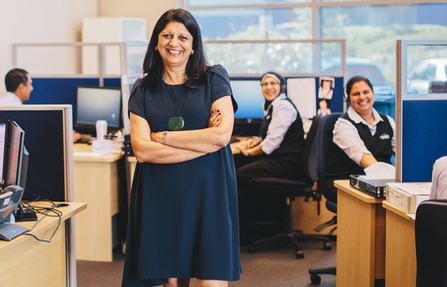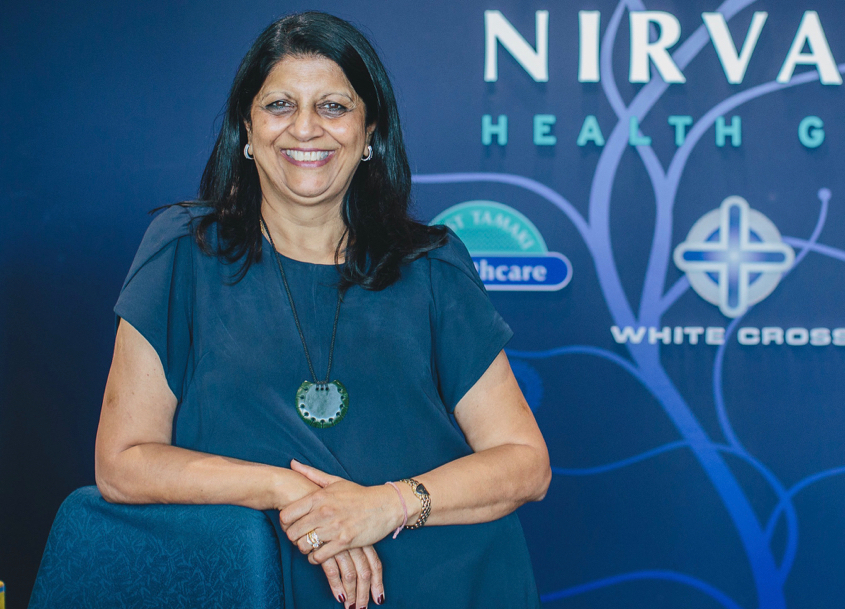When I telephone Ranjna Patel to set up this interview she’s warm and accommodating; my gut tells me she’s a pleasure to deal with, and it’s bang on.
She’s also a busy lady. From being one half of the founders of Auckland’s largest healthcare provider, Nirvana Health Group, with its 35 clinics, to challenging prejudices and working for community good, she’s in there boots and all. That said, she’s only found the nerve to start being a spokesperson over the past three or four years.
“I used to think, ‘But I don’t have a qualification.’
However, being successful in business, and people’s support and encouragement, has given me the courage to have a voice,” she says.
RACISM
Ranjna is a third-generation New Zealander. She married Dr Kantilal (Kanti) Patel in the 1970s.
“In the past I didn’t tell the story, as it was an arranged marriage and I felt we’d be judged,” she says. “I met him on 27th November and we were married on 8th December. I was fine with that. I believe you can’t overanalyse things because then you’ll find holes in everything. Some of my friends were quite vocal about it being ‘forced’, but then not so long afterwards they were saying, ‘Can we become Indian? We can’t find anyone!’”
Kanti’s medical degree wasn’t recognised in New Zealand. “It was a catch-22. People would say, ‘We’ll give you a job when you get registration’ or ‘Get a job and then we’ll look at your registration’,” says Ranjna. For the first time she came face to face with racism. “I’d grown up in Herne Bay, which was a multicultural community and I’d never felt any racism, but once I married a professional it really hit. I don’t want to be negative about it, but it’s definitely a reality.”
Kanti discovered an American exam that qualified him for New Zealand. “But a well meaning doctor friend told us no one would refer, we’d have to go where people were like us,” she says. “So, in 1977, we purchased a practice in Otara. The business came with a house, Kanti was the doctor and I was the receptionist. Our oldest son, Rakesh, was just two. It was only open for two to three hours in the morning and again in the afternoon. We extended it to 10 hours because the community needed it.”

I believe you can't overanalyse things because then you'll find holes in everything.
DOING IT DIFFERENTLY
“From the beginning our business has been all about the customer. The normal practice wasn’t working and South Auckland was a region that was labelled as a community that didn’t look after itself,” she says. “We understand that if there’s no car, or food is short, health won’t be the first priority. Barriers like transport and time off work can be huge. It’s why we extended our hours and make house calls. Children under 18 have always been free and we’ve never turned away a person who couldn’t pay. We decided very early on that money isn’t everything.”
Because of this the business grew quickly. “We got audit after audit after audit because the powers that be thought we must be doing something dodgy,” says Ranjna.
VALUES & SYSTEMS
“Our people are very important to us,” says Ranjna. “We have an HR department, but I sit in on every final interview. I am there to see if that person is happy to serve. Are they caring, trusting and professional? We are a values-based organisation and we expect our people to live by our values, and that can be challenging.”
Nirvana Health Care has a central call centre where 11 languages are spoken at a time, and there are more than 40 languages spoken amongst staff to cater for patients for whom English is not a first language.
While Kanti is clinically focused, Ranjna is operations driven and believes its their systems, consistency and quality of care that sets them apart.
Their Mental Health team were given the freedom to do what works for the patients and their Allied Health team is dedicated to recalls and education. “There are many doctors and nurses who can’t get registration in New Zealand,” says Ranjna. “It’s an untapped workforce. They are great educators with a wealth of knowledge.”

Ranjna wears the pounamu presented to her when she was inducted into the New Zealand Hall of Fame for women entrepreneurs
There is no limit to what we can achieve, so long as we don't mind who gets the glory.
COMMUNITY
Since she’s found her fearlessness, Ranjna has moved mountains in the community. She’s worked closely with the Ministry of Health, Counties Manukau DHB, Counties Manukau.
Police, the National Advisory Council on the Employment of Women, the Manukau and Auckland Indian Associations, and the Lottery Auckland Communication Committee.
“I have run women’s group conferences for the Indian Association and food was a big part of their interests,” says Ranjna. “I started introducing other things, like martial arts workshops, dealing with grief and cancer, and breathing exercises. I also introduced the sergeant from Counties Manukau Rape Crisis. In India, marital rape is not a crime and it’s very hidden in the Indian community. One in three women is abused and no one acknowledges it. I feel if I try and slowly expose it, some may come forward. I’m trying to empower women.”
Ranjna also put herself through the MIT course for family violence (“Every six minutes police are called nationally because of violence.”) and found a rundown house and called it Gandhi Nivas (man of peace home). Sahaayta (a trust that supports the South Asian community) and Counties Manukau ethnic liaison officer Sergeant Gurpreet Arora cleaned it up. Friends of Fiji Health donated furniture, and a fundraiser raised $45,000. It’s now manned by counsellors, so men who are stressed out and possibly in attack mode can go there to cool off and get counselling, or sleep it off if they’re drunk.
Nirvana also funds FitLife, a free eight-week boot camp in Otara. It’s run by D65 Fitness and has seen 300 people turn up at 6am at MIT carpark.
In addition Ranjna and Kanti were the founding trustees of the Hindu temple in Balmoral. “My husband is very religious. He’s also very visionary,” says Ranjna. “Thirteen years ago a church came up for sale in Wentworth Avenue and, although it was five years in the making, we built a temple there. We feed 400-500 people every Sunday. The Trust bought 20 houses around the temple that can give migrants a low rental. It felt so good not long ago when two girls who had been renting one of the houses told us they’d saved enough to buy a house!”
The business that began as one doctor now incorporates East Tamaki and West Harbour Healthcare and the White Cross chain under the umbrella of Nirvana Health Group. It has 200,000 patients, 35 clinics and 800 staff, including 300 doctors, and it sees 4000 patients a day.
“I feel quite hollow sometimes taking the credit for the organisation,” says Ranjna, “as I’m very aware of my limitations. My strength is my team. I don’t have a lot of competencies in a lot of areas. I haven’t done anything except facilitate. My people are my strength, in all facets of my life. From the business to my husband and three children, and my pride and joys: seven grandchildren.
MOMENTS OF FEARLESSNESS
- “We’ve been under the radar with all of this until recently, but now I’ve got the courage to talk about it, the courage to come out. The fear was there because you get criticised. Tall poppy syndrome is a big issue in NewZealand, because when you do things differently people are suspicious.
- “I look Indian even though I’m a Kiwi, born and bred. The ethnic population mindset is very different and I feel that segment of the population needs a voice.”
five tips for business success